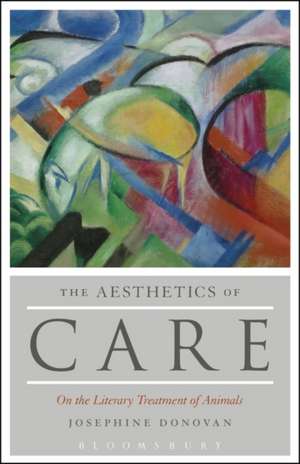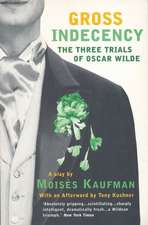The Aesthetics of Care: On the Literary Treatment of Animals
Autor Professor Josephine Donovanen Limba Engleză Paperback – iun 2016
| Toate formatele și edițiile | Preț | Express |
|---|---|---|
| Paperback (1) | 189.86 lei 6-8 săpt. | |
| Bloomsbury Publishing – iun 2016 | 189.86 lei 6-8 săpt. | |
| Hardback (1) | 826.09 lei 6-8 săpt. | |
| Bloomsbury Publishing – iun 2016 | 826.09 lei 6-8 săpt. |
Preț: 189.86 lei
Preț vechi: 222.31 lei
-15% Nou
Puncte Express: 285
Preț estimativ în valută:
36.34€ • 37.87$ • 30.25£
36.34€ • 37.87$ • 30.25£
Carte tipărită la comandă
Livrare economică 04-18 ianuarie 25
Preluare comenzi: 021 569.72.76
Specificații
ISBN-13: 9781501317200
ISBN-10: 1501317202
Pagini: 256
Dimensiuni: 140 x 216 x 22 mm
Greutate: 0.32 kg
Editura: Bloomsbury Publishing
Colecția Bloomsbury Academic
Locul publicării:New York, United States
ISBN-10: 1501317202
Pagini: 256
Dimensiuni: 140 x 216 x 22 mm
Greutate: 0.32 kg
Editura: Bloomsbury Publishing
Colecția Bloomsbury Academic
Locul publicării:New York, United States
Caracteristici
Major new work by a leading feminist and environmentalist literary critic, author of a number of pioneering books, including Feminist Theory, which has sold over 25,000 copies in four editions
Notă biografică
Josephine Donovan is Professor Emerita of English at the University of Maine, USA. She is the author or editor of 13 books, including Women and the Rise of the Novel, 1405-1726 (2d. rev. ed., 2013), which was named a Choice Outstanding Academic Title, After the Fall (1989), and The Feminist Care Tradition in Animal Ethics (2007, co-edited with Carol J. Adams). Her groundbreaking Feminist Theory (first published, 1985; fourth edition, 2012), which was also named a Choice Outstanding Academic Title and described as "the classic survey and analysis of the roots and development of feminist theory," has been translated into Chinese, Turkish, and Japanese.
Cuprins
PrefaceIntroduction1. The Aesthetics of Modernity 2. Willa Cather's Aesthetic Transitions3. The Aesthetics of Care4. Animal Ethics and Literary Criticism5. Tolstoy's Animals6. Local-Color Animals7. Coetzee's Animals8. Metaphysical Meat: "Becoming Men" and Animal Sacrifice9. The Transgressive Sublime, Katharsis, and Animal Sacrifice10. Caring to Hear, Caring to See: Art as EmergenceConclusionBibliography Index
Recenzii
[A] welcome contribution to the cultural project of making nonhuman animals more than props that represent human experiences . Donovan opens avenues for re-reading animals in literature as beings with agency, not just representations of human anxieties and aspirations . The Aesthetics of Care: On the Literary Treatment of Animals offers a practicable blueprint for turning the literature classroom into a site of cultural inquiry in advance of the speciesist standard.
Donovan enlivens literary criticism with a fresh understanding of its aesthetic dimension, one that brings the reader into caring communion with other animals. Her wonderfully interdisciplinary book successfully combines perspectives from critical theory, literature, and philosophy.
What a pleasure to reread such literary super-stars as Tchekov, Tolstoy, Willa Cather, George Sand, Sarah Orne Jewett, Virginia Woolf, and even Sophocles-now as care ethicists! One of the more remarkable things about this book is how Donovan's exquisitely sensitive reading of this literature models the moral attention she asks us to learn. Her aesthetics, which is thoroughly grounded in an ontology, a standpoint epistemology, and a moral orientation of care, of caring about other animals, more specifically, should resonate with those in critical animal studies, literary theorists in English departments, care ethicists, feminists who want theory that's truly inclusive, with all of us who are sickened by the aestheticizing and normalizing of violence against other animals. For Donovan, Keats' negative capability is both an aesthetic and a moral imperative-every animal, from Tolstoy's beetle to Sand's ox, as empathically loved as Keats' nightingale.
Drawing on years of work in literary criticism, eco-criticism, and feminist care ethics, Josephine Donovan provides an amazing and eloquent articulation of an 'Aesthetics of Care.' Bursting with invaluable readings of literary works and philosophy, Donovan offers a prism and a principle, equipping us to bring ethical concern for the natural world and the other animals to literature.
This volume makes a substantial contribution to several disciplines-literary studies, feminist studies, environmental studies, and philosophy as well as animal studies. Donovan (emer., English, Univ. of Maine) has written or edited some dozen previous works, including the acclaimed Feminist Theory: The Intellectual Traditions (CH, Apr'86). Building on foundation laid in The Feminist Care Tradition in Animal Ethics: A Reader, which she coedited with Carol Adams (2007), Donovan takes issue with the ways in which the philosophies of Descartes and Kant have influenced aesthetic theory since the Enlightenment and offers instead a distinctly feminine aesthetics of care focused on nonhuman animals but with far-reaching implications for human interactions with the environment as well. Donovan engages with a range of complex philosophical issues and writes about them with spirit, precision, and astonishing clarity, making her work accessible to a wide interdisciplinary audience. Literary scholars will find that her analysis is enhanced by examples from an array of authors whose works exemplify an "aesthetics of care" tradition, including Sophocles, Chekhov, Tolstoy, Cather, and Woolf. This extraordinary book, written by a mature master teacher, is a remarkable achievement. Summing Up: Essential. Lower-division undergraduates through faculty.
Donovan enlivens literary criticism with a fresh understanding of its aesthetic dimension, one that brings the reader into caring communion with other animals. Her wonderfully interdisciplinary book successfully combines perspectives from critical theory, literature, and philosophy.
What a pleasure to reread such literary super-stars as Tchekov, Tolstoy, Willa Cather, George Sand, Sarah Orne Jewett, Virginia Woolf, and even Sophocles-now as care ethicists! One of the more remarkable things about this book is how Donovan's exquisitely sensitive reading of this literature models the moral attention she asks us to learn. Her aesthetics, which is thoroughly grounded in an ontology, a standpoint epistemology, and a moral orientation of care, of caring about other animals, more specifically, should resonate with those in critical animal studies, literary theorists in English departments, care ethicists, feminists who want theory that's truly inclusive, with all of us who are sickened by the aestheticizing and normalizing of violence against other animals. For Donovan, Keats' negative capability is both an aesthetic and a moral imperative-every animal, from Tolstoy's beetle to Sand's ox, as empathically loved as Keats' nightingale.
Drawing on years of work in literary criticism, eco-criticism, and feminist care ethics, Josephine Donovan provides an amazing and eloquent articulation of an 'Aesthetics of Care.' Bursting with invaluable readings of literary works and philosophy, Donovan offers a prism and a principle, equipping us to bring ethical concern for the natural world and the other animals to literature.
This volume makes a substantial contribution to several disciplines-literary studies, feminist studies, environmental studies, and philosophy as well as animal studies. Donovan (emer., English, Univ. of Maine) has written or edited some dozen previous works, including the acclaimed Feminist Theory: The Intellectual Traditions (CH, Apr'86). Building on foundation laid in The Feminist Care Tradition in Animal Ethics: A Reader, which she coedited with Carol Adams (2007), Donovan takes issue with the ways in which the philosophies of Descartes and Kant have influenced aesthetic theory since the Enlightenment and offers instead a distinctly feminine aesthetics of care focused on nonhuman animals but with far-reaching implications for human interactions with the environment as well. Donovan engages with a range of complex philosophical issues and writes about them with spirit, precision, and astonishing clarity, making her work accessible to a wide interdisciplinary audience. Literary scholars will find that her analysis is enhanced by examples from an array of authors whose works exemplify an "aesthetics of care" tradition, including Sophocles, Chekhov, Tolstoy, Cather, and Woolf. This extraordinary book, written by a mature master teacher, is a remarkable achievement. Summing Up: Essential. Lower-division undergraduates through faculty.














